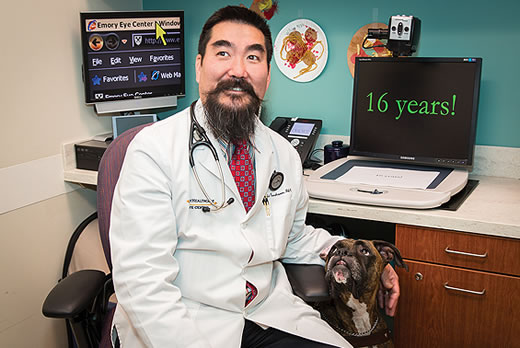David Furukawa, a physician assistant at Emory Eye Center for 16 years, can't easily see the writing on a document, but he could see the proverbial writing on the wall. It was time to retire.
Since being diagnosed with retinitis pigmentosa (RP) as a pre-med student, Furukawa has known that his eyesight would continue to degenerate. He chose an alternate medical path, and as a young PA he came to Emory for genetic testing, to learn whether he would likely pass along the RP gene to children.
A Chance to Help Others
The physician he saw, David Saperstein, mentioned that the department needed a PA to do medical assessments for surgery, and suggested that Furukawa apply: "We know your eye condition, so we can watch you; and you can empathize with our patients better than most."
After interviewing with former Eye Center director Thomas Aaberg and others, Furukawa began his new job in March 1997. "All the doctors agreed," he recalls, "that my personal experience of vision loss, in addition to my professional skills, would give me insight into what the patients were feeling."
Over the years, this gifted man — president of the Japanese American Citizens League, Civil War re-enactor, board member of Foundation Fighting Blindness — has heartened patients and staff alike with his profound empathy, his generous laugh, and his conviction that vision goes far beyond physical seeing.
"I've been very fortunate," he says, "that the doctors, the staff, and the low vision clinic have provided the visual aids I needed." In his office, a closed-circuit TV with adjustable magnification and contrast makes any document legible; programs on his computer magnify text and read aloud material onscreen.
Retirement
With his guide dog, Rocky, Furukawa has for years been a familiar sight along the hallways and tunnels of Emory. But this year his eyesight took a turn for the worse: "Looking at a face, I see only a circle big enough to contain eyes, nose, mouth. It has become difficult to navigate the campus, difficult to do my job."
Furukawa has a clear vision, however, for his retirement: "I'll be a house husband; a Mr. Mom for my fouryear- old son; and medical manager for the family – including my 96-year-old grandmother."
Furukawa says, "Emory has been an extraordinary opportunity. The enormous support I've received has prolonged my career far beyond what I could have managed in a private practice setting; and I've grown greatly here as a person. I love the docs, and I love the staff."
"David is an admirable person, a superb clinical specialist, and a dedicated staff member," says director Timothy Olsen. "He serves as a courageous leader for the visually impaired, having demonstrated firsthand that proper accommodations, training and a positive attitude can enable successful and meaningful employment. We will miss David at the Eye Center."
Furukawa expects to continue seeing Emory Eye friends occasionally: "I'll be coming back regularly for my eye appointments – and for those of my extended family." As Furukawa leaves, then, Emory Eye Center could simply say, "See you around!" But there's another word that sees things as they truly are. To David, in Japanese syllables that mean "If it must be…" Emory Eye Center says "Sayonara."

